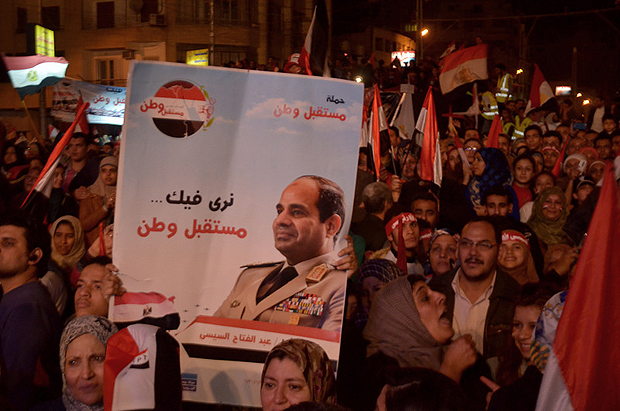
Egyptian demonstrators chanting for the army and police and raising flags and banners bearing images of General Abdel Fattah al-Sisi. But since the military-backed removal of Mohamed Morsi in summer 2013, academic freedom has been further corroded. (Image: Adham Khorshed/Demotix)
Since the military-backed overthrow of Mohamed Morsi’s government last summer, censorship of journalism in post-revolutionary Egypt has become an urgent concern of human rights and freedom of expression organisations. A quieter and more gradual undercurrent to the question of censorship, however, has been the continued corrosion of academic freedom of expression in post-revolutionary Egypt.
Under Hosni Mubarak’s regime, academic freedom within Egypt was notoriously limited, not least by the fact that since 1994, deans and presidents of public universities were appointed by the state, and professional career progress in academia frequently depended on compliance with the state line. Political activism was prohibited on campus and police units were stationed inside universities to “maintain order”. However, the dramatic increase of Egyptians in higher education in the last fifteen years of the Mubarak era – without the improvement of either higher education facilities or graduate employment prospects – is widely held to have been a central factor in the popular uprising that overthrew the regime in 2011.
Activist academics played a pivotal role in the 2011 revolution. In particular, the March 9 movement, founded in 2004, acted as a complement to the more clandestine student activist April 6 movement, and was comprised of politicised professors and academic administrators who were focused on protesting the impingement of academic life by the state.
As such, the post-Mubarak era was heralded by many as new “window“ for academic freedom in Egypt and “an opportunity to revive the Egyptian universities’ founding ideals as autonomous institutions seeking knowledge for knowledge’s sake.” Like freedom of the press, however, none of the “stages” of the post-revolutionary period have allowed this to come to fruition. Under the immediate, post-revolutionary, interim SCAF period, and under Morsi’s short-lived presidency, university reform was never substantively addressed, whilst activism on campuses splintered along the increasingly polarised lines of post-revolutionary political discourse. Moreover, many of the student activists of the 2011 uprisings were concerned at the possibility of Islamist encroachment on academic freedom of expression, and the policing of secular and female students’ activities at universities.
Since the military-backed removal of Morsi in summer 2013, and the mass violence that accompanied it, academic freedom has been further corroded both by the discourse and strategies of the new ruling powers on the one hand, and by the return of university premises as physical sites of political violence. The return of state security to campuses has been met with resistance from student activists and those who see it as a return to Mubarak-era surveillance of the university space. This has, however, been framed as a necessary step to prevent further violence as that witnessed since late 2013, which saw intense clashes at Al-Azhar University and an engineering student shot dead on the Cairo University campus.
Alongside the physical space of the university, the discipline of academic practice has been significantly impinged by the increasingly fractious and polarised political situation. Like journalists, academics have been caught in the political cross-fire of the post-July 2013 government’s campaign against the Muslim Brotherhood, who the government declared a terrorist organisation in December. Over the summer, two Canadian academics were detained for nearly two months despite no independent proof that they had engaged with the Muslim Brotherhood or taken part in “terrorist activities”.
As Ursula Lindsey has noted in The New York Times, political scientists working on the subject of contemporary Egyptian politics have faced particular difficulties. The 2011 revolution is itself now the subject of academic study, yet its protracted aftermath impedes research, and academics such as Nathan J Brown, a leading scholar on Egypt’s constitutions and judiciary, have noted that foreign academics are now cautious against travelling to Egypt for research. The military-backed government that overthrew Morsi has engaged in both a physical clampdown and a war of narratives with the Muslim Brotherhood, quick to frame all association with the Islamist organisation as collusion.
This presents particular problems for academics who wish to conduct interviews for the purpose of academic research. After all, this time last year, Morsi’s Muslim Brotherhood-backed regime was the official government, and, as such, academic researchers would likely have had contact with the group — not out of political allegiance but in order to conduct their studies. Yet such “contact” can now find scholars isolated, silenced, or even accused of “espionage”, as in the case of Professor Eman el-Din Shahin. Professor Shahin’s colleagues have spoken out in his defence, arguing that he is a well-respected and thorough researcher whose contact with political enemies of the new regime would have been in his legitimate capacity as a researcher. Such a climate is naturally conducive to self-censorship on the part of other academics, a loss for all of us who wish to understand and engage with contemporary Egypt. As an academic, you may not be politicised, but the state is very interested in politicising you.
The March 9 movement, formed in the Mubarak era by scholars seeking freedom of academic expression, marked its anniversary last month in sombre circumstances — these new challenges for academic freedoms overlay the continuing, unresolved issues of the pre-2011 period, from workplace nepotism to underfunding in public education. The uprisings of 2011 were ignited in part by the March 9 movement’s campaign for academic freedom of expression, yet in the various incarnations of the post-revolutionary order, this dream is still far from being realised.
This article was posted on 15 April 2014 at indexoncensorship.org




